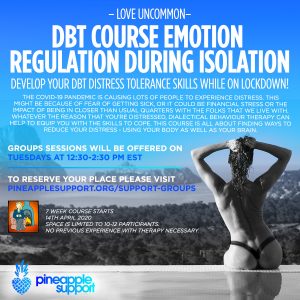Free Emotion Regulation, DBT Course with Sophia Graham
Who am I?
I’m a disabled, queer coach and therapist working primarily with marginalised individuals and groups. I’m especially excited about working with people interested in building psychological skills so they feel more able to manage the challenges in their lives in their own way. I believe that we are the experts in our own lives and that finding new tools and developing new skills helps us to create the lives we want to live.
Why work with performers?
Therapy professionals, in general, have not been great at working with people outside the mainstream. This means that performers can really struggle to access high-quality support. As someone that has had been really let down in the past by judgemental and unprofessional therapists, I know what that is like. I also know that it takes a huge toll on people’s wellbeing, and sometimes costs lives. I want that to change, and I’m doing my bit to try to make that change in the world.
What is Dialectical Behaviour Therapy (DBT)
Dialectic Behaviour Therapy (DBT) is a non-pathologising approach that teaches skills for creating a life worth living. It focuses on the areas of mindfulness, interpersonal effectiveness, distress tolerance and emotional regulation. The DBT approach is one of the most heavily researched and validated forms of psychotherapy. It was initially designed for clients with a borderline personality disorder diagnosis but has been found to be effective in relation to a broad range of diagnoses including depression and anxiety. This is a peer group where we work together to learn DBT skills and practice them in our lives between sessions. One of the most important parts of this approach is working with others to understand the skills we are learning. Homework is an essential component of DBT, and you will be given worksheets to complete each week between sessions. We go through these in detail each session, and that’s where a lot of the learning happens, as people are able to share their experiences, successes and challenges.
Why emotion regulation?
Out of control emotions can make it hard to maintain friendships, romantic relationships and can even jeopardise our careers. Many of us never learned the skills we need to cope with difficult emotions, and that makes it impossible to deal effectively with stressful or distressing situations that inevitably come up in our lives. This course teaches participants how to recognise, understand and regulate emotions so that they have more choices about how to manage day to day stressors and distressing events.
Why interpersonal effectiveness?
Our efforts to manage our own emotions are frequently challenged by our interactions with other people. Sometimes this leads us to behave in ways that we later regret. Other times we can fail to speak up assertively for what we need, which can lead to resentment or misunderstandings later. This course is about empowering us to handle interpersonal situations more effectively.
Why distress tolerance?
There are no lives without pain, and everyone has crises at times. These times of intense emotional dysregulation can lead to out of control behaviours that can damage our relationships, life and reputation. This course teaches techniques for reducing emotional activation and distress. It equips participants with skills to practice in their lives so they are able to deal with crises more effectively and cope better with intense distress.
Time commitment
You will attend a 2-hour session each week and complete homework between sessions which usually takes between 20 minutes and an hour.
What do you do in a group meeting?
We start with a mindfulness exercise, then in each session after the first, we go through the homework and discuss each of our experiences with it for the first hour. This hour helps us to consolidate our skills and troubleshoot any problems. Then we have a 5-10 minute break before learning a new skill.

To apply please please click on the link found at pineapplesupport.org/support-groups

